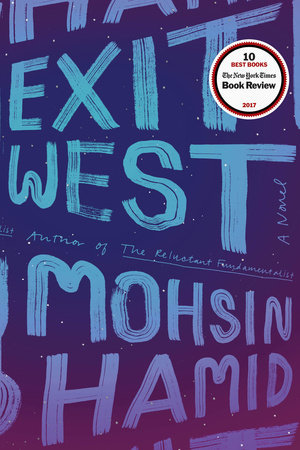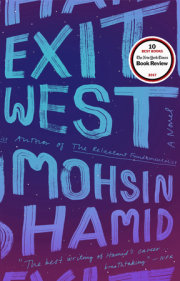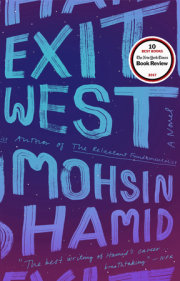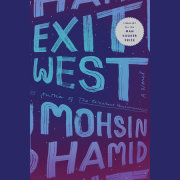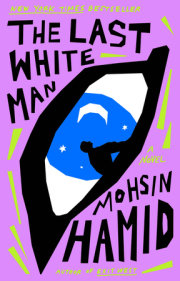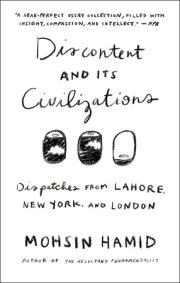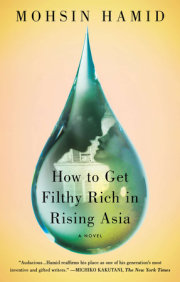In a city swollen by refugees but still mostly at peace, or at least not yet openly at war, a young man met a young woman in a classroom and did not speak to her. For many days. His name was Saeed and her name was Nadia and he had a beard, not a full beard, more a studiously maintained stubble, and she was always clad from the tips of her toes to the bottom of her jugular notch in a f lowing black robe. Back then people continued to enjoy the luxury of wearing more or less what they wanted to wear, clothing and hair wise, within certain bounds of course, and so these choices meant something.
It might seem odd that in cities teetering at the edge of the abyss young people still go to class—in this case an evening class on corporate identity and product branding—but that is the way of things, with cities as with life, for one moment we are pottering about our errands as usual and the next we are dying, and our eternally impending ending does not put a stop to our transient beginnings and middles until the instant when it does.
Saeed noticed that Nadia had a beauty mark on her neck, a tawny oval that sometimes, rarely but not never, moved with her pulse.
Not long after noticing this, Saeed spoke to Nadia for the first time. Their city had yet to experience any major fighting, just some shootings and the odd car bombing, felt in one’s chest cavity as a subsonic vibration like those emitted by large loudspeakers at music concerts, and Saeed and Nadia had packed up their books and were leaving class.
In the stairwell he turned to her and said, “Listen, would you like to have a coffee,” and after a brief pause added, to make it seem less forward, given her conservative attire, “in the cafeteria?”
Nadia looked him in the eye. “You don’t say your evening prayers?” she asked.
Saeed conjured up his most endearing grin. “Not always. Sadly.”
Her expression did not change.
So he persevered, clinging to his grin with the mounting desperation of a doomed rock climber: “I think it’s personal. Each of us has his own way. Or . . . her own way. Nobody’s perfect. And, in any case—”
She interrupted him. “I don’t pray,” she said. She continued to gaze at him steadily.
Then she said, “Maybe another time.”
He watched as she walked out to the student parking area and there, instead of covering her head with a black cloth, as he expected, she donned a black motorcycle helmet that had been locked to a scuffed-up hundred-ish cc trail bike, snapped down her visor, straddled her ride, and rode off, disappearing with a controlled rumble into the gathering dusk.
The next day, at work, Saeed found himself unable to stop thinking of Nadia. Saeed’s employer was an agency that specialized in the placement of outdoor advertising. They owned billboards all around the city, rented others, and struck deals for further space with the likes of bus lines, sports stadiums, and proprietors of tall buildings.
The agency occupied both floors of a converted townhouse and had over a dozen employees. Saeed was among the most junior, but his boss liked him and had tasked him with turning around a pitch to a local soap company that had to go out by email before five. Normally Saeed tried to do copious amounts of online research and customize his presentations as much as possible. “It’s not a story if it doesn’t have an audience,” his boss was fond of saying, and for Saeed this meant trying to show a client that his firm truly understood their business, could really get under their skin and see things from their point of view.
But today, even though the pitch was important—every pitch was important: the economy was sluggish from mounting unrest and one of the first costs clients seemed to want to cut was outdoor advertising—Saeed couldn’t focus. A large tree, overgrown and untrimmed, reared up from the tiny back lawn of his firm’s townhouse, blocking out the sunlight in such a manner that the back lawn had been reduced mostly to dirt and a few wisps of grass, interspersed with a morning’s worth of cigarette butts, for his boss had banned people from smoking indoors, and atop this tree Saeed had spotted a hawk constructing its nest. It worked tirelessly. Sometimes it floated at eye level, almost stationary in the wind, and then, with the tiniest movement of a wing, or even of the upturned feathers at one wingtip, it veered.
Saeed thought of Nadia and watched the hawk.
When he was at last running out of time he scrambled to prepare the pitch, copying and pasting from others he had done before. Only a smattering of the images he selected had anything particularly to do with soap. He took a draft to his boss and suppressed a wince while sliding it over.
But his boss seemed preoccupied and didn’t notice. He just jotted some minor edits on the printout, handed it back to Saeed with a wistful smile, and said, “Send it out.”
Something about his expression made Saeed feel sorry for him. He wished he had done a better job.
As Saeed’s email was being downloaded from a server and read by his client, far away in Australia a pale-skinned woman was sleeping alone in the Sydney neighborhood of Surry Hills. Her husband was in Perth on business. The woman wore only a long T-shirt, one of his, and a wedding ring. Her torso and left leg were covered by a sheet even paler than she was; her right leg and right hip were bare. On her right ankle, perched in the dip of her Achilles tendon, was the blue tattoo of a small mythological bird.
Her home was alarmed, but the alarm was not active. It had been installed by previous occupants, by others who had once called this place home, before the phenomenon referred to as the gentrification of this neighborhood had run as far as it had now run. The sleeping woman used the alarm only sporadically, mostly when her husband was absent, but on this night she had forgotten. Her bedroom window, four meters above the ground, was open, just a slit.
In the drawer of her bedside table were a half-full packet of birth control pills, last consumed three months ago, when she and her husband were still trying not to conceive, passports, checkbooks, receipts, coins, keys, a pair of handcuffs, and a few paper-wrapped sticks of unchewed chewing gum.
The door to her closet was open. Her room was bathed in the glow of her computer charger and wireless router, but the closet doorway was dark, darker than night, a rectangle of complete darkness—the heart of darkness. And out of this darkness, a man was emerging.
He too was dark, with dark skin and dark, woolly hair. He wriggled with great effort, his hands gripping either side of the doorway as though pulling himself up against gravity, or against the rush of a monstrous tide. His neck followed his head, tendons straining, and then his chest, his half-unbuttoned, sweaty, gray-and-brown shirt. Suddenly he paused in his exertions. He looked around the room. He looked at the sleeping woman, the shut bedroom door, the open window. He rallied himself again, fighting mightily to come in, but in desperate silence, the silence of a man struggling in an alley, on the ground, late at night, to free himself of hands clenched around his throat. But there were no hands around this man’s throat. He wished only not to be heard.
With a final push he was through, trembling and sliding to the floor like a newborn foal. He lay still, spent. Tried not to pant. He rose.
His eyes rolled terribly. Yes: terribly. Or perhaps not so terribly. Perhaps they merely glanced about him, at the woman, at the bed, at the room. Growing up in the not infrequently perilous circumstances in which he had grown up, he was aware of the fragility of his body. He knew how little it took to make a man into meat: the wrong blow, the wrong gunshot, the wrong flick of a blade, turn of a car, presence of a microorganism in a handshake, a cough. He was aware that alone a person is almost nothing.
The woman who slept, slept alone. He who stood above her, stood alone. The bedroom door was shut. The window was open. He chose the window. He was through it in an instant, dropping silkily to the street below.
While this incident was occurring in Australia, Saeed was picking up fresh bread for dinner and heading home. He was an independent-minded, grown man, unmarried, with a decent post and a good education, and as was the case in those days in his city with most independent-minded, grown men, unmarried, with decent posts and good educations, he lived with his parents.
Saeed’s mother had the commanding air of a schoolteacher, which she formerly was, and his father the slightly lost bearing of a university professor, which he continued to be—though on reduced wages, for he was past the official retirement age and had been forced to seek out visiting faculty work. Both of Saeed’s parents, the better part of a lifetime ago, had chosen respectable professions in a country that would wind up doing rather badly by its respectable professionals. Security and status were to be found only in other, quite different pursuits. Saeed had been born to them late, so late that his mother had believed her doctor was being cheeky when he asked if she thought she was pregnant.
Their small flat was in a once handsome building, with an ornate though now crumbling facade that dated back to the colonial era, in a once upscale, presently crowded and commercial, part of town. It had been partitioned from a much larger flat and comprised three rooms: two modest bedrooms and a third chamber they used for sitting, dining, entertaining, and watching television. This third chamber was also modest in size but had tall windows and a usable, if narrow, balcony, with a view down an alley and straight up a boulevard to a dry fountain that once gushed and sparkled in the sunlight. It was the sort of view that might command a slight premium during gentler, more prosperous times, but would be most undesirable in times of conflict, when it would be squarely in the path of heavy machine-gun and rocket fire as fighters advanced into this part of town: a view like staring down the barrel of a rifle. Location, location, location, the realtors say. Geography is destiny, respond the historians.
War would soon erode the facade of their building as though it had accelerated time itself, a day’s toll outpacing that of a decade.
When Saeed’s parents first met they were the same age as were Saeed and Nadia when they first did. The elder pair’s was a love marriage, a marriage between strangers not arranged by their families, which, in their circles, while not unprecedented, was still less than common.
They met at the cinema, during the intermission of a film about a resourceful princess. Saeed’s mother spied his father having a cigarette and was struck by his similarity to the male lead in the movie. This similarity was not entirely accidental: though a little shy and very bookish, Saeed’s father styled himself after the popular film stars and musicians of his day, as did most of his friends. But Saeed’s father’s myopia combined with his personality to give him an expression that was genuinely dreamy, and this, understandably, resulted in Saeed’s mother thinking he not merely looked the part, but embodied it. She decided to make her approach.
Standing in front of Saeed’s father she proceeded to talk animatedly with a friend while ignoring the object of her desire. He noticed her. He listened to her. He summoned the nerve to speak to her. And that, as they were both fond of saying when recounting the story of their meeting in subsequent years, was that.
Saeed’s mother and father were both readers, and, in different ways, debaters, and they were frequently to be seen in the early days of their romance meeting surreptitiously in bookshops. Later, after their marriage, they would while away afternoons reading together in cafés and restaurants, or, when the weather was suitable, on their balcony. He smoked and she said she didn’t, but often, when the ash of his seemingly forgotten cigarette grew impossibly extended, she took it from his fingers, trimmed it softly against an ashtray, and pulled a long and rather rakish drag before returning it, daintily.
The cinema where Saeed’s parents met was long gone by the time their son met Nadia, as were the bookshops they favored and most of their beloved restaurants and cafés. It was not that cinemas and bookshops, restaurants and cafés had vanished from the city, just that many of those that had been there before were there no longer. The cinema they remembered so fondly had been replaced by a shopping arcade for computers and electronic peripherals. This building had taken the same name as the cinema that preceded it: both once had the same owner, and the cinema had been so famous as to have become a byword for that locality. When walking by the arcade, and seeing that old name on its new neon sign, sometimes Saeed’s father, sometimes Saeed’s mother, would remember, and smile. Or remember, and pause.
Saeed’s parents did not have sex until their wedding night. Of the two, Saeed’s mother found it more uncomfortable, but she was also the more keen, and so she insisted on repeating the act twice more before dawn. For many years, their balance remained thus. Generally speaking, she was voracious in bed. Generally speaking, he was obliging. Perhaps because she did not, until Saeed’s conception two decades later, get pregnant, and assumed therefore she could not, she was able to have sex with abandon, without, that is, thought of consequences or the distractions of child-rearing. Meanwhile his typical manner, throughout the first half of their marriage, at her strenuous advances, was that of a man pleasantly surprised. She found mustaches and being taken from behind erotic. He found her carnal and motivating.
After Saeed was born, the frequency with which his parents had sex dipped notably, and it continued to decline going forward. A uterus began to prolapse, an erection became harder to maintain. During this phase, Saeed’s father started to be cast, or to cast himself, more and more often, as the one who tried to initiate sex. Saeed’s mother would sometimes wonder whether he did this out of genuine desire or habit or simply for closeness. She tried her best to respond. He would eventually come to be rebuffed by his own body at least as much as by hers.
In the last year of the life they shared together, the year that was already well under way when Saeed met Nadia, they had sex only thrice. As many times in a year as on their wedding night. But his father always kept a mustache, at his mother’s insistence. And they never once changed their bed: its headboard like the posts of a banister, almost demanding to be gripped.
In what Saeed’s family called their living room there was a telescope, black and sleek. It had been given to Saeed’s father by his father, and Saeed’s father had given it in turn to Saeed, but since Saeed still lived at home, this meant the telescope continued to sit where it always sat, on its tripod in a corner, underneath an intricate clipper ship that sailed inside a glass bottle on the sea of a triangular shelf.
The sky above their city had become too polluted for much in the way of stargazing. But on cloudless nights after a daytime rain, Saeed’s father would sometimes bring out the telescope, and the family would sip green tea on their balcony, enjoying a breeze, and take turns to look up at objects whose light, often, had been emitted before any of these three viewers had been born—light from other centuries, only now reaching Earth. Saeed’s father called this time-travel.
On one particular night, though, in fact the night after he had struggled to prepare his firm’s pitch to the soap company, Saeed was absentmindedly scanning along a trajectory that ran below the horizon. In his eyepiece were windows and walls and rooftops, sometimes stationary, sometimes whizzing by at incredible speed.
“I think he’s looking at young ladies,” Saeed’s father said to his mother.
“Behave yourself, Saeed,” said his mother. “Well, he is your son.”
“I never needed a telescope.”
“Yes, you preferred to operate short-range.”
Saeed shook his head and tacked upward.
“I see Mars,” he said. And indeed he did. The second-nearest planet, its features indistinct, the color of a sunset after a dust storm.
Saeed straightened and held up his phone, directing its camera at the heavens, consulting an application that indicated the names of celestial bodies he did not know. The Mars it showed was more detailed as well, though it was of course a Mars from another moment, a bygone Mars, fixed in memory by the application’s creator.
In the distance Saeed’s family heard the sound of automatic gunfire, flat cracks that were not loud and yet carried to them cleanly. They sat a little longer. Then Saeed’s mother suggested they return inside.
When Saeed and Nadia finally had coffee together in the cafeteria, which happened the following week, after the very next session of their class, Saeed asked her about her conservative and virtually all-concealing black robe.
“If you don’t pray,” he said, lowering his voice, “why do you wear it?”
They were sitting at a table for two by a window, overlooking snarled traffic on the street below. Their phones rested screens-down between them, like the weapons of desperadoes at a parley.
She smiled. Took a sip. And spoke, the lower half of her face obscured by her cup.
“So men don’t fuck with me,” she said.
Copyright © 2017 by Mohsin Hamid. All rights reserved. No part of this excerpt may be reproduced or reprinted without permission in writing from the publisher.

